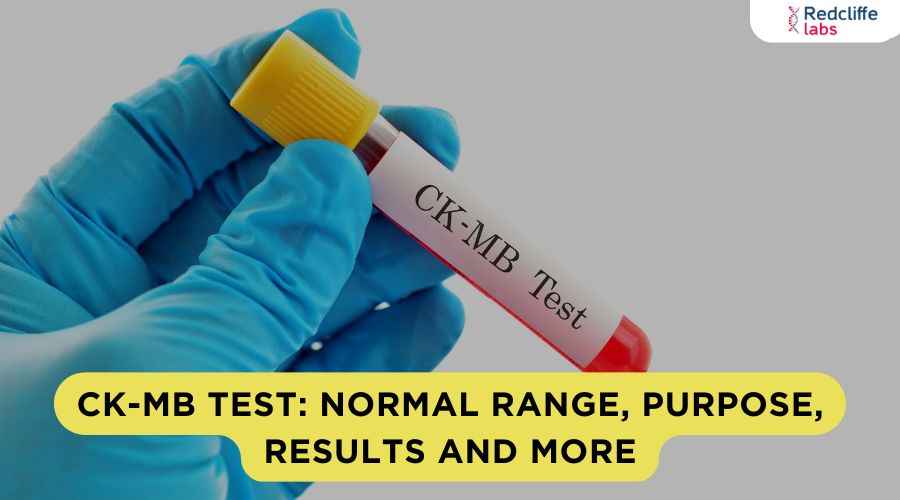CK-MB Test: Normal Range, Purpose, Results and More

Medically Reviewed By
Prof. Ashok Rattan
Written By Sheena Mehta
on Feb 19, 2025
Last Edit Made By Sheena Mehta
on Jul 19, 2025

Are you worried about your heart health? Get the CK-MB blood test to learn your heart's actual condition. CK is also known as creatine phosphokinase (CPK).
The test measures the creatine kinase-MB levels, an enzyme in the heart muscle. It is crucial for diagnosing and monitoring heart conditions such as heart attacks and myocardial infarction.
Additionally, the doctor evaluates the CK-MB levels to check for heart muscle damage and guide treatment effectively.
This article typically provides comprehensive information about the CK-MB test, including how to prepare for it, the procedure, risks, the CK-MB normal range, and more.
So, why wait? Let’s discover it in detail.
What is a creatine kinase?
Creatine Kinase (CK) is an enzyme that supports muscle energy production. It has three isozymes: CK-MM, CK-MB, and CK-BB.
The main job of the CK is to add a phosphate group to creatine. A phosphate group is a naturally occurring group of chemicals, and creatine is a substance in muscle cells that aids muscle energy production.
An increased amount of CK is involved with heart attack, skeletal muscle injury, intense exercises, or muscle disorders. On the other hand, CK’s activity also affects the gastrointestinal tract, urinary bladder, and brain.
Importance of Creatine Kinase-MB Test
Creatine Kinase- MB (CK-MB) test is done to detect the presence of CK-MB enzyme in the blood. The test differentiates between skeletal and heart muscle damage. A healthcare provider also suggests the creatine-kinase Test if a troponin test is unavailable. He wants to determine if you have had a heart attack.
High CK-MB levels can indicate the need for cardiac injury, allowing the expert to make informed decisions about your treatment.
A CK-MB test has several purposes, which we will discover in today’s blog. Before that, let's examine the symptoms associated with a creatine kinase-MB test.
Common symptoms associated with a CK-MB test:
- Shortness of breath
- Tiredness
- Sudden sweating
- Lightheadedness
- Nausea
- Vomiting
- Pain in the neck, jaw, back, or left arm
- Pain or discomfort
What is the purpose of a CK-MB test?
Also known as the CPK test, the CK-MB test is the most specific indicator for diagnosing an acute myocardial infarction. It is done for several purposes, including:
- Diagnose conditions: The primary purpose of a CK-MB test is to detect conditions associated with heart muscle damage. Usually, a doctor suggests troponin T and troponin tests to check for cardiac problems; in some cases, the CK-MB test is also done to help detect a second or subsequent heart attack.
- Measures the CK-MB levels: A CK test is also done to measure the levels of Creatine Kinase-MB. An increased CK amount in the blood indicates possible skeletal muscle injury or heart damage. Nonetheless, more recently, the elevated CK levels resulted in several deaths.
- Diagnose muscle diseases: The test is most often used to help diagnose and monitor muscle diseases such as:
- Muscular dystrophy refers to a group of more than 30 genetic conditions that cause muscle weakness and loss of muscle mass.
- Rhabdomyolysis refers to the breakdown of the muscle tissue, releasing proteins and electrolytes in the blood. It is an uncommon condition that can damage the heart and cause sudden kidney failure.
- Myositis is a rare autoimmune disease in which your immune system attacks your muscles. It can cause long-term inflammation, weakness, and sometimes pain.
- Diagnose severity of stroke: A CK test may also be done to determine the severity of a stroke or traumatic brain injury (TBI). Also, it helps predict the chance of getting a stroke in the future.
- Medications: A doctor may also prescribe the CK-MB test if you take medications such as statins to lower high cholesterol, which may cause muscle damage.
Strategies to prevent heart disease
- Below are helpful tips to prevent heart disease:
- Regular physical exercise
- Quit tobacco and smoking
- Salt in moderation
- Eat a well-balanced diet
- Maintain a healthy weight
- Monitor your cholesterol
- Reduce alcohol consumption
- Maintain your blood sugar and BP level
Also read: https://redcliffelabs.com/myhealth/lab-test/blood-tests-for-heart-diagnosing-heart-conditions/
What are the benefits of a CK-MB test?
A CK-MB (creatine kinase-MB) is a blood test primarily used to diagnose heart attacks and other cardiac conditions. Below are the key benefits of a CK-MB test:
- The CK-MB test helps confirm if chest pain or other symptoms occur due to a heart attack. When a heart muscle is damaged, CK-MB levels rise.
- CK-MB helps differentiate heart-related damage from muscle injuries that occur due to intense exercise, trauma, or other conditions.
- Serial CK-MB tests help track heart muscle damage and its progression.
- CK-MB is helpful in quick and early detection. The levels rise within 3-6 hours of a heart attack, peak around 12-24 hours, and then return to normal 48-72 hours.
- A CK-MB test can help differentiate between old and new heart muscle damage.
- Additionally, the CK-MB also shows that the increased CK-MB levels are due to myocarditis and other heart-related muscles.
What is the normal range for CK MB?
A CK-MB blood test measures the creatine kinase (CK) amount in your blood. The test results interpretation:
CK-MB levels in men and women
- Normal range: 0–5 ng/mL (nanograms per milliliter), or less than 5% of total CK levels. This indicates no significant heart muscle damage.
Mildly elevated levels (5-10 ng/mL)
- This may indicate minor heart stress, muscle injury, or early myocardial infarction.
Significantly elevated levels (>10 ng/mL or >6% of total CK):
- It is suggestive of a heart attack or severe cardiac muscle damage.
Not to be missed
The CK-MB levels rise within 3-6 hours after a heart attack, peak at 12-24 hours, and normalize within 48-72 hours.
How to Manage Abnormal CK-MB levels
Abnormal CK-MB (creatinine kinase-MB) levels indicate damage to the heart muscle. Cardiac or non-cardiac reasons can cause these levels.
Cardiac reasons behind elevated CK-MB levels:
- Myocardial infarction (heart attack). In this condition, the CK-MB levels rise within 3-6 hours after a heart attack and peak within 12-24 hours.
- Myocarditis: It is the inflammation of the heart muscle, resulting in elevated CK-MB levels.
- Pericarditis is inflammation of the heart lining, resulting in a mild rise in CK-MB levels.
- Cardiac surgery or procedures: Sometimes, bypass surgery, angioplasty, or even a pacemaker implant can increase CK-MB levels.
- Heart failure: damaged heart muscles due to congestive heart failure resulting in an elevation.
Non-cardiac reasons behind elevated CK-MB levels include:
- Trauma or injury such as burns, muscle injury, or electrical shocks results in elevated CK-MB levels.
- Severe physical exercise: Strenuous exercises can also cause a temporary rise in CK-MB levels.
- Sepsis or severe infection can directly affect the heart muscle.
- Abnormal thyroid level: Muscle metabolism can be impacted by thyroid imbalance (hyperthyroidism or hypothyroidism).
- Lung conditions: Blood clot formation may increase the CK-MB levels.
Note: Show your reports to your healthcare provider to understand the meaning of your specific test results. He will assess your CK-MB test results and curate personalized treatment plans to manage the underlying condition.
Helpful Tips to manage abnormal CK-MB test results
Below are helpful tips for managing abnormal CK-MB test results:
Elevated levels
- Need for immediate care: Elevated CK-MB levels can be managed with immediate care. If a doctor suspects heart attacks, he may suggest angioplasty or thrombolysis.
- Medications such as beta-blockers or ACE inhibitors can be suggested to manage heart conditions.
- Lifestyle changes include a heart-healthy diet, regular exercise, and quitting smoking.
Mild Levels
- Additional Testing: A healthcare provider may also suggest ECG or troponin tests, as they more specifically show heart damage.
- Regular checkups: Mild elevated CK-MB levels can be monitored over time through regular follow-ups.
Conclusion
The CK-MB blood test is a valuable diagnostic tool for assessing heart muscle damage. Elevated CK-MB levels are often linked to heart-related conditions such as muscle injuries, infections, or strenuous physical activity.
Various factors can cause fluctuations in CK-MB levels; therefore, additional testing, such as troponin tests, ECG, and clinical evaluation, may be suggested for accurate diagnosis.
Discuss reports with your healthcare provider for further medical evaluation, determine the underlying cause of abnormal CK-MB levels, and initiate appropriate treatment.
FAQ:
1. How can I prepare for a CK-MB test?
Eat your regular meals before the test (no fasting is needed). Stay hydrated to prepare for the blood draw. Ask your doctor if you must stop taking your regular medicines before the test to avoid interfering with your result.
2. What happens during the CK-MB test?
During the CK-MB test, a phlebotomist will insert a needle into a vein in your arm to collect a small amount of blood. This collected blood sample will be labeled and sent to a diagnostic lab for analysis.
3. Are there any risks associated with the CK-MB blood test?
The CK-MB blood test is simple and safe. The minimal risks involved are mild pain or discomfort and bruising or swelling at the puncture site. Although rare, if you experience infection, bleeding, or dizziness after the test, contact your healthcare provider immediately for medical assistance.
4. How long does it take to receive the CK-MB test results?
Redcliffe Labs typically provides the CK-MB test results within 24 hours. The report can be downloaded from the website.
Leave a comment
1 Comments
Dev
May 4, 2025 at 7:08 PM.
Mera ck mb 31 hai kya karo
Myhealth Team
May 9, 2025 at 12:58 PM.
Agar aapka CK-MB level 31 hai, toh yeh heart muscle strain ya damage ka indication ho sakta hai. Doctor se consult karen aur further tests jaise ECG ya troponin test karaen. Apna lifestyle healthy rakhein aur doctor ke advice follow karen.



